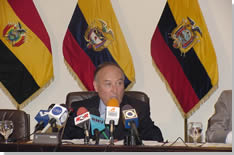
Colombia: approvals for US$926 million in 2004
During 2004, approvals in favor of Colombia totaled US$926 million, representing 26% of the total of US$3.50 billion. The sum was allocated in line with the country’s strategic institutional priorities, which include government programs of public investment incorporating private investment, support for macroeconomic stability and structural reforms, and the strengthening of SMEs.
In the area of infrastructure, projects were supported in the transport sector for US$482 million, including US$150 million for improvement and expansion of urban infrastructure for passenger travel, part of the Bogota Urban Development Program. In this operation, US$65 million were destined for the program and US$85 million to partially finance the nation's participation in integrated mass transport systems, including Transmilenio, a system that began to be successfully implemented into the city three years ago.
In 2004 three important loans were approved for the national government. The first for US$32 million will finance the construction of the pilot tunnel to start the La Linea Tunnel project. The second was a US$250-million loan to support the government's economic program.
The third loan for US$150 million promotes private participation in the construction of public works in the framework of the Plan 2,500 Kilometers, whose objective is to improve access and traffic circulation, with a positive impact on the competitiveness of domestic production. This operation is expected to attract funds from other sources, confirming the CAF’s catalytic role.
The financial stimulus for Competitiveness, Productive Sectors and MSMEs totaled US$100 million through state development banks, with approval of a credit facility for the Colombian Foreign Trade Bank. Funds totaling US$80 million were channeled through the financial system to meet needs for working capital and the investment plans of the productive sector, including the participation of nine financial institutions.
In the area of Governance and Social Capital, US$4 million in cooperation funds were approved for various projects. For governance, the CAF continued to support strengthening actions, focusing on four lines of work: ethics and transparency; institutional strengthening; decentralization and citizen participation; and leadership for the transformation. The "Governance and Political Management" program continued to train leaders and their support groups, in alliance with the universities of El Rosario, Bucaramanga and Francisco de Paula Santander. The second program, "Transparent and Efficient Municipalities," is being executed in alliance with the OAS Agency for Development (AICD) and the Canadian Agency for International Cooperation. The program aims to transfer the best practices identified in electronic government and cadastre.
Lastly, 460 leaders were trained this year in the "Leadership for Transformation" program, which provided tools to exercise citizenship with responsibility, and ethical and democratic values.
The CAF also promoted cultural and community development projects in an effort to generate capacities and promote responsibility and social capital. The music program in its orchestra, choral and flute sections was strengthened, particularly in Medellín, and sports instruction was provided for marginal communities in Ciudad Bolívar in Bogotá and for the Wayuu in La Guajira, primarily in alliance with the country’s private and public sectors.
Important progress was made in productive community work, especially in the craft sector and in the Network of Towns Project. With the support of the Cundinamarca departmental government and 71 of its municipalities, the Network Project is aimed at participative community building of agendas and portfolios of self-management projects. The first phase of a project to strengthen productive and marketing processes with cacao families in Valle del Cauca was completed, in an alliance with Corporación VallenPaz, local commerce and international actors.
In the cooperation sphere, the CAF, through agreements with the Ministry of Finance, is partially financing technical support for negotiations on financial services in the Free Trade Treaty with the United States, and access to the banking system for low-income sectors by financing a study on bank usage, microcredits and other financial instruments.
Another important operation agreement was signed with Bancafé, a state bank, for US$200,000 to strengthen the institution. In addition to these funds, the agreement provides for the technical advice from the CAF to improve the success of the process.
CAF's more recent content

CAF, ECLAC, IDB and PAHO Promote Sustainable Development in the G20
The Regional Organizations of the Americas congratulate Brazil on its successful G20 Presidency, highlighting its leadership on key issues such as poverty, governance, and climate change. They also reaffirm their commitment to actions that promote equity and development in the region.
Urgent Call for Action to Safeguard Caribbean SIDS at CAF Symposium
As the global community grapples with the escalating climate crisis, Caribbean Small Island Developing States (SIDS) are running out of time to secure critical investments and support needed to strengthen their economies and protect vulnerable communities from the intensifying impacts of climate change. With the window to take decisive action rapidly shrinking, CAF - Development Bank of Latin America and the Caribbean, in partnership with the Commonwealth Secretariat and the Antigua and Barbuda High Commission, brought together key stakeholders for a symposium in London to address the critical vulnerabilities Caribbean SIDS face.